- Home
- William Goldman
Adventures in the Screen Trade Page 6
Adventures in the Screen Trade Read online
Page 6
Problem: Can you have a musical succeed in which the main character can't thrill you? I happen not to think so. With Kelly or Astaire, Pennies from Heaven might have gone through the roof. The audience I saw it with began wanting desperately to love it, and they ended--those who didn't walk out--whipped and silent.
To repeat, this was hindsight. And I think if I had been the studio executive that had a shot at these projects, I would have grabbed them all. Maybe they didn't work on the screen.
But they sure sounded great in shorthand....
S Number Three: Salvation
As stated, the knowledge of their eventual decapitation is central to the life of the studio executive. And as also stated, when that happens, they will "go indie-prod," which is both easier and more lucrative. So why do the executives care at all if their movies succeed? Because there is a giant caveat involved: the better they've done as executives, the longer their life span, the fatter the deal they can strike for themselves when they're canned. None of the Heaven's Gate group at UA got rich when they were told to get lost.
So it's essential to the studio executive to be, at least for a time, successful.
And since nobody knows anything, and since the studio heads today haven't got a lot of faith in their creative instincts (since they've never been creative), they turn, for salvation, to the one thing that got them where they are: stars.
If you have a slate of films that are low budget and successful, as Frank Price had recently at Columbia, you're obviously in great shape. But if you have a slate of low-budget films that stiff, you're not just a failure, you're a double disaster: Not only did your pictures die, you couldn't even attract "elements."
Well, you can't have that. Which is why the cry of every studio executive on the way to the guillotine has been the same: "You can't do this to me, I got you a Charles Bronson picture. I was the one who signed Stallone. Ryan O'Neal only did our movie because we have a strong personal relationship. Kris Kristofferson thinks I'm creative. Jimmy Caan told me personally he wants to work for me again. And so did Donald Sutherland. And Chuck Heston. Liza and Ali and I are buddies. And Lee Marvin and I have dinner together. And... and--"
--and the blade always falls.
One fact of movie life must always be faced: Stars are kept in orbit by studio executives who are trying to save their own jobs....
THE NONRECURRING PHENOMENON
Studio executives, as we have observed, are totally responsible for what we see on the screen. I'm sure even the biggest stars have some pet subject or another they can't get off the ground--Jane Fonda has been trying for years to make a movie about industrial cancer, for example. We've also noted that they, like the rest of us, don't know what will work. But there is one thing they absolutely do know, and that is what has worked. Which is why it is safe to say that movies are always a search for past magic.
"Shit, if I could just get Richard Pryor and Gene Wilder together again, I'd be safe." (I know of one project in which the studio bought a book for a producer and had a screenplay written, which the studio liked, except they wanted one little change in the next draft: The main character had to be changed from white to black. Why? Because Richard Pryor is hot again, that's why.)
They know from their accountants what worked in the past, and they can give you the reasons why. Here is a list of films released in 1981 that took in twenty-five million dollars.
Raiders of the Lost Ark--$90,000,000
Superman II--$64,000,000
Stripes--$39,000,000
Any Which Way You Can--$39,000,000
Arthur--$37,000,000
The Cannonball Run--$35,000,000
The Four Seasons--$26,000,000
For Your Eyes Only--$25,000,000
Ask a studio executive about these successes, and he'll say:
"Raiders? Great adventure picture, great special effects, Lucas and Spielberg. Great adventure pictures always clean up. Arthur? Great romantic comedy; always room for a great romantic comedy. And the public was falling in love with Dudley Moore. The rest are really sequels to other hits in one way or another, and sequels always do great. Superman II was a sequel, so was the Eastwood, so was the Bond flick. Stripes was like Meatballs, there's always a market for Bill Murray in a comedy. And Cannonball was Reynolds in a Smokey rip-off. That everything?"
Well, it's almost everything, but what about Four Seasons'?
Then our mythical studio man says this: "It was Alan Alda and Carol Burnett. They've got a lot of fans."
You respectfully point out that if they have so many fans, why have almost all their previous movies been failures?
There then follows a longer silence before you get his final answer: "Four Seasons? That was a 'nonrecurring phenomenon.' "
Remember that phrase.
What it means, of course, is this: It was a freak, a fluke, a once-in-a-lifetime occurrence. The deeper and more important meaning is this: "Get away, boy, you bother me." It's a nonrecurring phenomenon--I don't have to think about it.
And why don't they want to think about it? It's too frightening--they are responsible for what gets made and they can live with not knowing if what they make is going to work or not. But not even knowing the kind of thing to make--well, the earth opens.
Why haven't there been rip-offs of Kramer Vs. Kramer? (Tv has done a bunch, but not Hollywood.) Because Kramer was a nonrecurring phenomenon. And so was Ordinary People.
Four Seasons had nothing going for it--no movie stars, no violence, it wasn't even all that funny. It was just this lovely movie about--about friendships, for chrissakes. So its success both depresses and frightens studio people. The audience, their audience--well, it shouldn't have gone. And in point of fact it didn't, not in the beginning. Who did?
There is a lot of talk in Hollywood as to what happened to the Sound of Music audience. I mean adults over twenty-five and children under twelve. Executives refer to it as "The Lost Audience." It's gone, simple as that--lost and by the wind grieved, never to come back again, locked forever with their living-room tube. Well, they left their homes long enough to see Four Seasons.
And there's one other 1981 hit that I didn't list earlier, because it opened too late in the year for its fate to be known. It's March as I write this, and the ultimate success of On Golden Pond is still not certain: How it does in the coming Oscar battle will affect it, as will the effect that word of mouth exerts. But On Golden Pond is already more popular than For Your Eyes Only, the James Bond film. And it's also passed the Reynolds and the Eastwood and Bill Murray. In fact, it conceivably can catch Superman II, making it one of the fifteen most popular films in American history.
Naturally, it's a nonrecurring phenomenon.
Freak casting, they'll tell you. Hank and Hepburn, Jane and Hank, that's all she wrote.
I don't believe that. Granting the skill and charm of those three performers, I think the movie would have worked every bit as successfully with other actors of equivalent skill--say Jimmy Stewart and Bette Davis with Susan Sarandon as their child. Or Jimmy Cagney or Fred Astaire teamed with Irene Dunne or Ingrid Bergman. With Blythe Danner or Sissy Spacek as the daughter.
When I saw On Golden Pond I heard something so wonderful, something I hadn't heard in a movie theatre in years--the sound of middle-aged laughter. Well, you're not going to hear much of that in the future. Do you realize how many copies of American Graffiti the studios have churned out in the last years? Or Halloween? Or Rocky? The stomach turns. Well, On Golden Pond may be bigger than any of them. And I'm sure they'll never rip it off.
Because it would mean a total opening up of what constitutes a commercial film. And that's scary--so much more comforting to make Death Wish XXIII.
Maybe the most depressing comment made to me while I was interviewing for this book was by a bright studio guy who told me why On Golden Pond was breaking through. He said, "It's because it's got Jane Fonda in it."
Now, Jane Fonda is a very big star, but the same fortnight that
On Golden Pond started, so did Rollover, another Jane Fonda film, only she wasn't the support in Rollover, she was the star--
--and it didn't open.
Total wipeout. Maybe twenty million down the tubes. This with a name co-star and a name director. So why did the studio guy say Fonda made On Golden Pond? Because he was desperate to come up with something, anything, that wouldn't shake the foundations of what he knew to be true--what kind of film to make.
There's a whole world of subject matter that will never be touched by the major studios. Because the executives know the sort of film that may work. Just like the bright boys in Detroit knew, a while back, that what the American public really wanted was a great big glossy gas-guzzling car. And all that interest that was starting in Japanese cars?
Just another nonrecurring phenomenon....
ALL NIGHT LONG
I don't know of any other movie that better illustrates the interrelationships of studio execs and stars than the Gene Hackman film All Night Long.
All Night Long is a fragile film, very short--it runs only eighty-four minutes and has a distinctly European feel, which is not surprising when you consider that the idea began with its ultimate director, the Frenchman Jean-Claude Tramont.
Tramont wanted to do a movie about people who work at night.
That was all he had, just that notion, but it struck a chord with the people at Fox, who said to go ahead and find a writer. They would develop it step by step.
Tramont found the wonderfully talented W. D. Richter (Slither, Invasion of the Body Snatchers), and Richter agreed to attempt a script. What Richter eventually wrote was the story of a man in crisis, a man named George Dupler. (The part eventually played by Hackman.)
George has worked, for twenty-plus years, in regional sales for a large pharmaceutical company. His wife is sort of a sludge, but not evil. His teen-age son also isn't much to crow over: The kid is done with school and, when he works at all, paints houses. George has the kind of life, then, that's okay if you're happy, terrible if you're not.
George isn't happy--all he ever wanted to do was be an inventor.
As the story opens, George has just been passed over for promotion. He takes the news badly: First he slugs his boss, then he throws a chair through a closed window. Because of seniority, he isn't fired; instead he is made the night manager of a huge California-type drugstore that is open all night long.
Now a distant relative dies, so George and his family pay a condolence call at the house of a macho-type fireman who also works at night. During the visit, George sees his son kissing the fireman's wife, Cheryl. The next day he confronts the kid and asks, are you having an affair with Cheryl? The answer is yes, but the kid adds that he loves her. George says to end it. The kid is upset.
That night Cheryl visits George in the store to talk about the situation. A few scenes later, George is at Cheryl's house, having a meal, when the kid rings the bell. George quickly sneaks out, hopefully without having been discovered.
But his son is convinced that his father is having an affair with the woman he loves--this news is spoken in front of George's wife--and George snaps. He packs up and leaves, taking a crummy room in a hotel.
Eventually, George and Cheryl actually begin an affair, but before it is consummated, she talks a little about her life. And her fears of being a failure. That's why her music is so important to her--she composes and her dream is to be a songwriter. But as she speaks about her music, it's sad. She's just a neb, poor Cheryl; a weak, sweet, quiet, pushed-around lonely lady. (She married her fireman husband only because he had saved her life: She said yes out of gratitude.)
When George and Cheryl are in love, he quits his job, rents a large space in a warehouse to be an inventor. He goes to a family gathering, bodily takes Cheryl off with him. But then she leaves--she hasn't the guts to stay.
Finally, she sucks it up and goes to the firehouse to talk to her husband, to try and take a stand. He's furious, shoves her around, and probably would do worse, when the alarm bell goes off.
George, it turns out, set the alarm. When the firemen are gone he pleads with her not to be afraid anymore. She hesitates, then slides down a fire pole into his arms and the two of them begin a new and, hopefully, better life.
Fox passed on the project.
Eventually it found its way to producer Leonard Goldberg, a giant television name (Hart to Hart, Family, etc.). Goldberg and his partner Jerry Weintraub (Nashville and Diner) had a deal at Universal that gave them the authority to make movies there whether Universal liked the movie or not--provided that the budget was low enough.
The budget of All Night Long could scarcely have been lower for these inflated times--three-million-and-change.
Universal didn't like it, felt they couldn't sell it, didn't want to do it. But for contractual reasons, they were not in a position to pass.
If Universal hated the project, Gene Hackman loved it. Hackman, an Oscar winner for The French Connection and one of our finest actors, was crazy to play the vehicle part of George. (Getting the script to Hackman undoubtedly caused no problem, since his agent is the most famous in Hollywood, Sue Mengers. Mengers had more than a little interest in the project, since she was married to the director, Jean-Claude Tramont.)
Hackman was so anxious to play the lead that he was willing to gamble: He would forfeit at least part of his up-front salary in exchange for a larger percentage at the other end; if the picture cleaned up, so would he.
Now, logic would dictate that since Universal didn't have any faith in the picture, they would have grabbed Hackman's offer. Since they felt the picture would stiff, why not keep costs down up front? Beyond that, if their feelings were correct, Hackman would essentially be doing the picture for nothing.
Universal insisted on paying him his regular salary. So the three-million-and-change movie was now going to cost four and a half.
With Hackman on board, the problems of casting the rest of the picture arose. Hackman's was the giant part--in almost every shot of almost every scene--but there were four major supporting roles: Hackman's wife, his son, the fireman, and of course Cheryl.
Cheryl was the most tricky. The creators felt that, sure, she was attractive, maybe even the belle of the block, but in the great world she shouldn't be a traffic stopper, because that would make the movie about a guy with hot pants. If this had been an English film, Julie Christie would have been wonderful--quiet, pretty but not too pretty, vulnerable. The studio suggested Loni Anderson, the sexpot on the tv series WKRP in Cincinnati.
Lisa Eichhorn got the part.
Eichhorn, a fine actress, had received wonderful reviews in the 1979 film Yanks. Screen World Annual selected her as one of the most promising new performers to appear that year, an honor Eichhorn shared with, among others, Bo Derek and Bette Midler. Probably Eichhorn has less instant star quality than these other two ladies, but the part of Cheryl, after all, didn't need star quality--not only is it a secondary role, the entire essence of the role is that this lady is the antithesis of a star. Shy, picked on, lost.
Shooting begins.
This is always a nervous time, but no giant problems arise. The first weeks go pretty much according to schedule.
Then comes the phone call.
Goldberg listens to the voice of agent Sue Mengers on the other end. Mengers parcels out this tidbit of information: Another of her clients would be interested in taking over the part of Cheryl. Who?
Only Barbra Streisand.
Goldberg hangs up, thinks awhile. There is no question in his mind that although both Hackman and Eichhorn are splendid in their roles, there is undeniably a certain chemistry that is lacking. Still, they're well into production.
No matter what, Goldberg can't just sit on the information. So he calls Universal and informs them that Barbra Streisand will do the Lisa Eichhorn part. Universal says, don't go anywhere, we'll get back to you.
Which they do. And now they love the picture. The sales force loves it, th
e advertising people are in ecstasy, fabulous.
Goldberg tries to explain that it's still the same little picture it always was, the one they so recently loathed, hated, and despised.
That was in another country, and besides the wench is dead.
All Night Long shuts down. For several weeks. Now, this is costly, because all the people who are on salary stay on salary, even though they're not doing anything.
But closing costs are nothing compared to what it takes to sign Streisand. No one knows the truth outside of the people who made the deal, but the rumor around town is four or four and a half million dollars plus a gigantic contribution to her favorite hospital charity. That's a lot of money, but Barbra Streisand is something very special.
As the lyrics to one of the songs she sang in her break-through role, Funny Girl, proclaim: "I'm the greatest star." The lady just may well be. Oh, you can argue that Reynolds or Redford or Eastwood is bigger by a hair at the box office--
--but do they sing? (Actually, Reynolds did once, in a 1975 stifferoo called At Long Last Love, but probably it's not his favorite topic of conversation.)
Has any female soloist ever sold as many records as Streisand? Name her.
She doesn't choose to play Vegas anymore, but when she did, she killed them. She doesn't choose to do television anymore, but when she did, her specials went through the roof. And if she ever chose to return to Broadway, she'd outrun Fiddler.
The most remarkable thing about Streisand is that she can do it all--there is no area of popular performing where she isn't it. Redford would sell out on Broadway, too, if he ever came back, and so would Reynolds, but how would they do standing alone for an hour on the stage of Caesars Palace with a microphone in their hands? In films, she has been the unquestioned female star for fifteen years. Her movies may not always be successes--Hello Dolly! cost too much to get its money back--but they have almost always done business in the past.

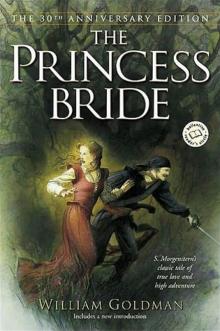 The Princess Bride
The Princess Bride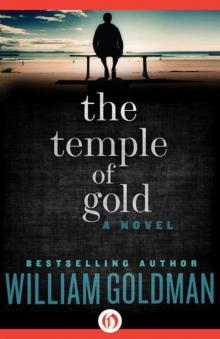 The Temple of Gold
The Temple of Gold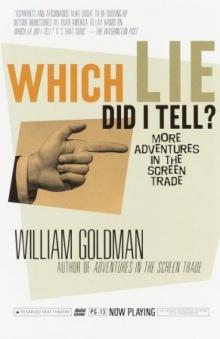 Which Lie Did I Tell?: More Adventures in the Screen Trade
Which Lie Did I Tell?: More Adventures in the Screen Trade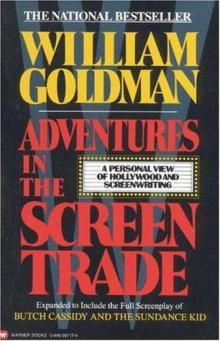 Adventures in the Screen Trade
Adventures in the Screen Trade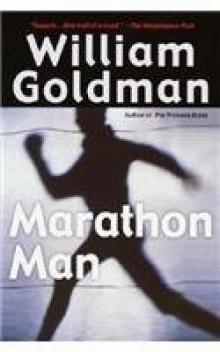 Marathon Man
Marathon Man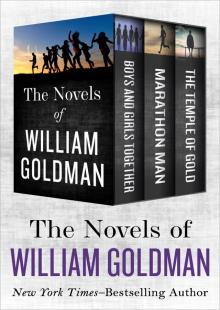 The Novels of William Goldman: Boys and Girls Together, Marathon Man, and the Temple of Gold
The Novels of William Goldman: Boys and Girls Together, Marathon Man, and the Temple of Gold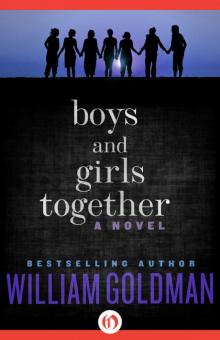 Boys and Girls Together: A Novel
Boys and Girls Together: A Novel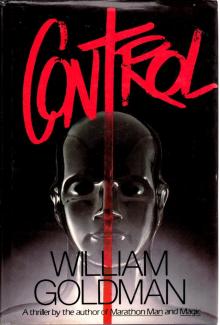 Control
Control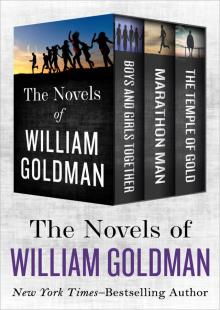 The Novels of William Goldman
The Novels of William Goldman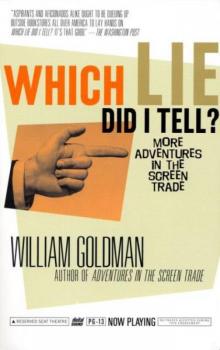 Which Lie Did I Tell?
Which Lie Did I Tell?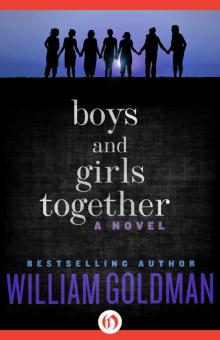 Boys & Girls Together
Boys & Girls Together